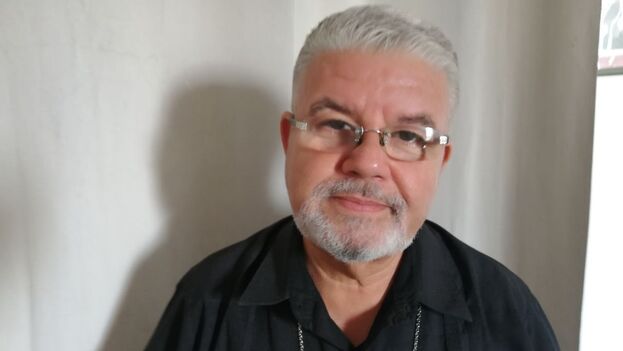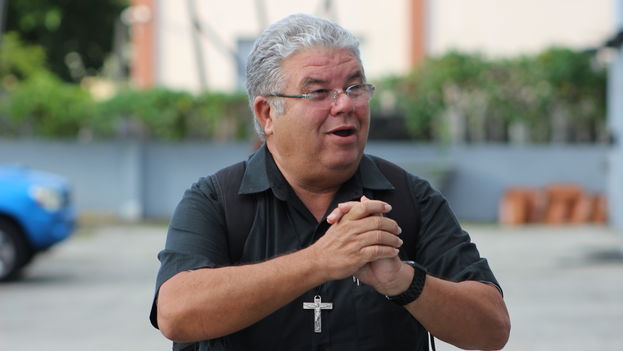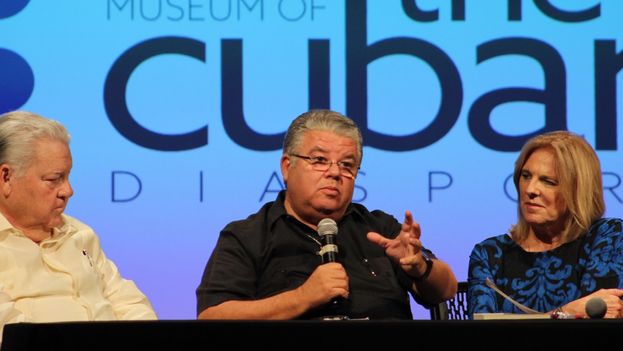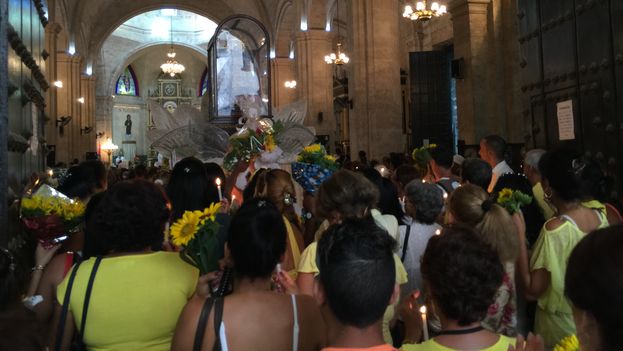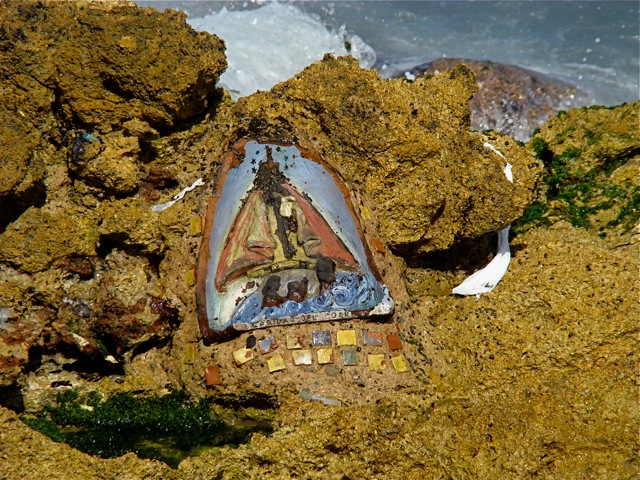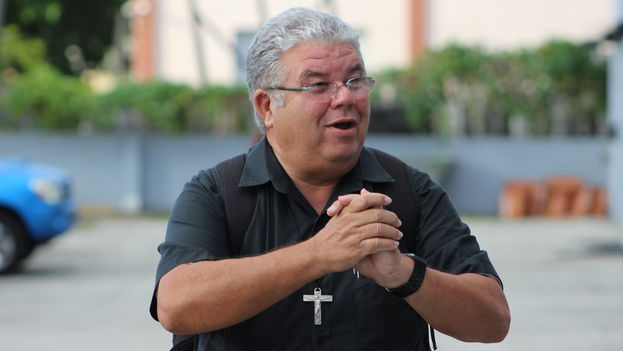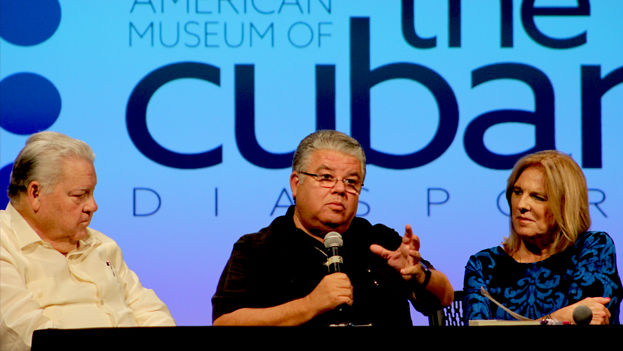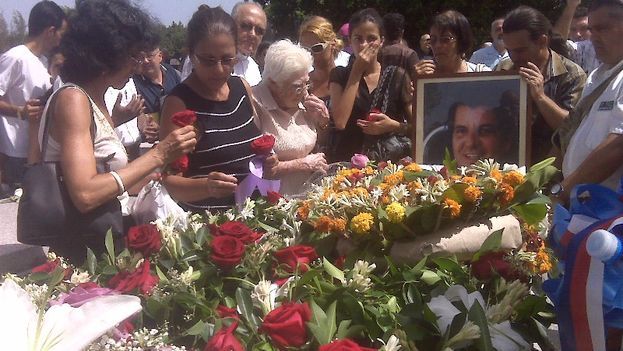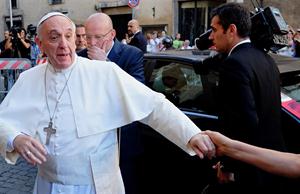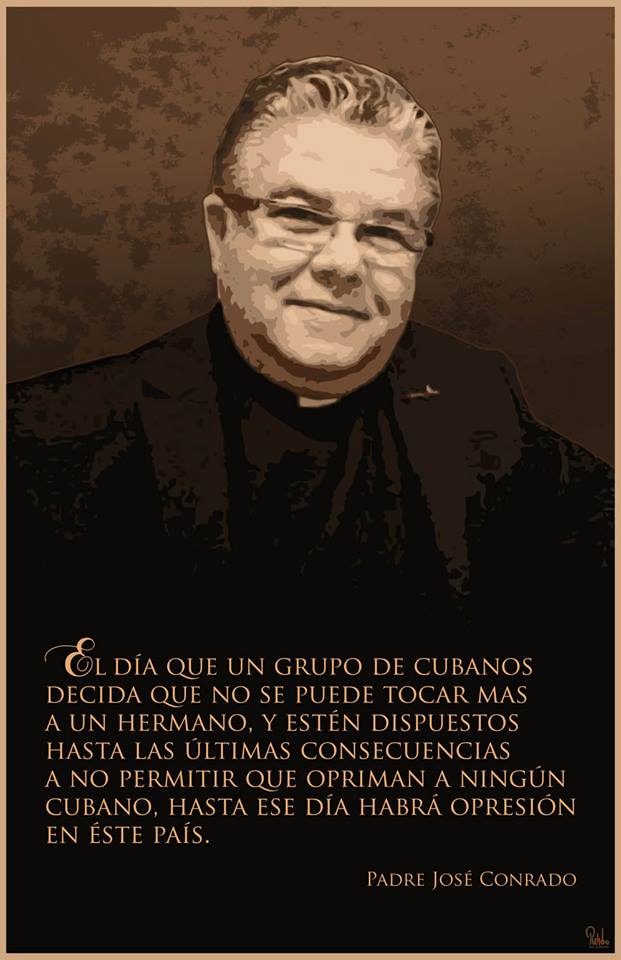For this reason, when two officials from the Party and the Municipal Ministry of Justice visited me to explain the measures that would be taken, I told them that we were in agreement and would support them without reluctance, as we had already received the recommendations that they had prepared in this regard from the Vatican commission for divine worship.
To the officials, I expressed my surprise at the official delay in taking the measures, given the rapid spread of the serious pandemic. I even invited them to see how we had already taken measures in the church, separating the pews, placing chlorine-soaked carpets and directing worsipers to wash their hands with hypochlorite water, when entering and leaving the church. continue reading
Later I would learn that in Europe advertisements appeared in magazines and newspapers to visit Cuba as a coronavirus-free tourist destination with a good healthcare system. To a friend who called me from abroad, worried about the Cuban response in the face of Covid-19, I replied: “They will know how to do it. They are good at managing disaster. They have been doing it for more than 60 years. What they don’t know is managing prosperity.”
“They are good at managing disaster. They have been doing it for more than 60 years. What they don’t know is managing prosperity.”
When the radical restraining order came, at the end of March, this meant zero visits to rural communities and to families in the city that occupied a good part of my time and, in addition, the solitary celebration of the mass. One of the couples of the parish appeared with a huge plastic bag filled with rice, beans, and mutton.
It was the beginning of a continual arrival of the most varied things: fresh and canned milk and meat, fresh and canned fish, soup powder envelopes, dehydrated potatoes, and all kinds of food, vegetables and fruits, etc. My refrigerator has never been more full, nor has my table been so well served as in these days of the coronavirus. Thanks to the generosity of my parishioners and even of people who do not belong to the community.
I quickly realized that it was necessary to create a new routine that would guide everyday life. In my case, with a marked family tendency to obesity, and since I would not have the possibility of my usual exercise, visiting the sick and my parishioners, “exercising at home” was required. But my house is a barely more than a hut. The guest room: with two beds, a wardrobe and open shelving is the receptacle for how much is lost, suitcases, donation clothes, electrical equipment, tools… A true Pandora’s box!
My bedroom-office-living room: in a space of less than 10 by 11 feet there are the bed, the desk, a cabinet, an open closet and an armchair. The walls are upholstered with books, pictures and paintings that my painter friends have given me: three Broches, (an excellent Trinidadian painter and beloved parishioner), a Cuban landscape of Calzada, some sunflowers from my son and former parishioner, José Miguel Martínez, and a landscape of the Camaguey Montes de Oca.
Here I decided to put my daily gym, each time taking out the chair and the fan. Very early in the morning my day begins with dancing for an hour to the rhythm of Celia Cruz, followed by a bath and morning prayer time: lauds and the office of readings, which culminate with the celebration of mass at 8.30 in the morning.
After breakfast “the pastoral work on the phone” begins from my multi-use room. I have been at it for up to eight uninterrupted hours, literally hanging on the phone
After breakfast “the pastoral work on the phone” begins from my multi-use room. I have been at it for up to eight uninterrupted hours, literally hanging on the phone, and wanting to hang myself with it, if I am to be honest. A turning point for me was learning, in the same week, of the death, in New Jersey, of my friend Miguelina Rodríguez, the extraordinary mother of a family and a militant and committed Catholic, who made her life a gift of love for others.
And of Víctor Batista Falla in Havana! A great cultural promoter and patron, founder and owner of the Colibrí publishing house. Víctor was the uncle of María Teresa Mestre Batista, the archduchess of Luxembourg. For sixty years he remained outside Cuba, most of the time in Spain. He had told me that he would never return to the Island.
But like Heredia the 19th century poet, in the end nostalgia overcame him. A few days after arriving, the disease was declared. And he died. The death of these two great friends was a severe blow to me and a different way of perceiving Covid-19.
On the other hand, as the news of what was happening in Italy and Spain came, my anguish was growing. In both countries I have a multitude of friends, of whom I knew nothing. Although the slogan of Etecsa, Cuba’s telecommunications company, is “in war and in peace we will maintain communications,” for those who have tried to communicate with Cuba, or from Cuba, it is a risky adventure and not always successful.
When I tried to install their “Nauta home” internet service, it was denied because I am an institution, not a family home. On the other hand, my pastoral work with the exile was concentrated on my trips outside of Cuba.
But when I arrived here I did not insist on telephone or electronic communication, so as not to interfere with my pastoral work here, more than abundant with such an extensive parish, in the city and in the countryside. At last I discovered a thing called mobile data, which gives me access to the internet and allows me to communicate by WhatsApp, a fairly expeditious way.
This is how I found out about the illness of my New Orleans cousins and my dear friend Miguelina Rodríguez from New Jersey. This is how I learned about my Madrid priest Jesús García Camón, my adoptive parents from Madrid, Papo and Nena Robles, Father José Manuel Sánchez Caro, my rector at the University of Salamanca, all safe and sound, and about my former teachers and colleagues from the University of Comillas, in Madrid. And so many others.
These solitary Masses allowed me to rediscover the Eucharist. Without an audience, I no longer had to worry about time
At daily mass I prayed for everyone. These solitary Masses allowed me to rediscover the Eucharist. Without an audience, I no longer had to worry about time. It was the Lord and me. My parishioners and friends were physically absent but my masses were pro vobis et pro multis: For you and for the mutitude. My Masses, without a homily, could last an hour and even longer.
In thanksgiving I would take my imaginary plane and tour my extensive parish, then all of Cuba, diocese by diocese, its bishops, priests, men and women religious, and laity. Later I went up to Miami, and from there, Tampa, Orlando, Jacksonville, Saint Augustine, Atlanta, Philadelphia, Washington, New Jersey, New York, Boston, and from Boston Canada. There I prayed for the nuncio Luigi Bonazzi, Sara Olga, Rogelio, Evelin, and so many other friends. I returned to the United States through Wisconsin, Chicago, Kentucky and the south-central United States: Louisiana, New Mexico, Phoenix, etc. Then I returned west, from Portland, San Francisco, Sacramento and Los Angeles, entered Mexico, and then flew over Central and South America… to the Caribbean, the Greater and Lesser Antilles: Puerto Rico, the Dominican Republic, Haiti and Jamaica, the Bahamas … to Spain, Italy, France… my friends from Poland, Sweden, Germany, the Czech Republic, former diplomats in Cuba and those who welcomed me in those countries when I went to receive the Geremek Prize. The Middle East and Africa where so many comrades from Comillas and Salamanca, Africans, work today. Russia, China, Japan, Philippines, India, Vietnam. Until ending in New Zealand and Australia. That is, the wide world, without excluding anyone.
In these days I have discovered the truth contained in the title of that book by Congar: Wide world, my parish. Countries and Churches; Cubans, whom I carry always in my heart, wherever they are, Catholics or not, believers or atheists. My Cuba with a capital letter, even those who consider me their enemy.
Even those who I think are wrong, because they excluded and banished those who think differently: how to forget what the Master – José Martí – said, when he portrayed himself in those verses that we learned as children: “I want when I die, without a country but without a master…” But without chauvinism, without excluding those who did not have the happiness of being born on this earth and under this sky. Because they too, those who are not Cubans, are my brothers.
People have almost naturally understood Covid-19 as a deserved warning for what we are doing to God’s creation. Not so much in the key of punishment, but more positively, in the key of warning
What does God mean by all this?
I have been struck by the fact that here in Cuba, and from what I see in other parts of the world, people have understood, almost naturally, Covid-19 as a deserved warning for what we are doing to God’s creation. Not so much in the key of punishment, but more positively, in the key of warning. I have called it “the divine knock.” We cannot continue as we were.
Perhaps Pope Francis came forward with his precious encyclical letter Laudato si. The Pope, taking up a Franciscan inspiration and perspective, so in keeping with his name and program as a Pontiff, with the added value of being a convinced and convincing Jesuit. The Pope has helped us understand the responsibility we have with the world, this magnificent and beautiful gift, which does not exclude, but includes the one who is the summit and crown of this divine gift, the human being, humanity. We are singers and maximum beneficiaries of creation, the stewards and custodians of this gift that is life itself, as a mystery and as a task.
That is why I dedicate these reflections to our dear supreme Shepherd, sometimes as criticized as misunderstood, even from within the Church. So with these reflections, I am making public a letter that I sent to Pope Francis two years ago. I did not make it public because in those days, which coincided with his visit to Chile, the Pope was object of so much criticism and rejection by different sectors in that country, although that had been my intention because it was an “open letter.” Nothing is further from me than collaborating with that negative and gratuitous environment, giving rise to being put in the same bag as those critics of the moment. The Pope is a prophet, I perceive it this way, and for this I want to thank him, from this my lost corner between the hills of Escambray.
Christ came to establish koinonia, communion, which has a concrete and direct expression in the kiss of peace, the fraternal embrace in the liturgy of Holy Mass. Normally, I never get tired of hugging my parishioners before and after Sunday mass: young people, children, adults or the elderly.
Trinidad, an eminently tourist city, with about 2,000 families that rent to tourists, is full of these voluntary slaves to the “tourist-God.” “I had to make breakfast for my tourists” is an excuse that I hear more than I would like when people have missed Mass on Sunday
I believe that for the majority of my parishioners coming to mass on Sunday is a favor that they do to God. But how easily they leave the Most High planted. Nothing is said when business is involved. Trinidad, an eminently tourist city, with about 2,000 families that rent to tourists, is full of these voluntary slaves to the “tourist-God.” “I had to make breakfast for my tourists” is an excuse that I hear more than I would like when people have missed Mass on Sunday.
Two months ago the tourists left but my parishioners have been left without the Sunday mass… and how much they yearn for it! In the city, nervousness is felt due to the lack of food, the endless lines and the growing lack of money, and it has everyone crying out for God: “How long, Lord, will you keep forgetting us… How long, Lord, will you hide your face!”
And I myself how many times did I cowardly fall silent without telling them what I clearly perceived as failure of my sheep! Many years ago, at a mass celebrated in Santa Teresita, my parish at the time, my dear Archbishop Pedro Meurice attacked the half-heartedness of our faithful. So strong was the rebuke that I felt compelled to defend the people by reminding my archbishop in the middle of mass of the difficult life they led. My wise father-bishop, when I finished speaking, said to me: “José Conrado, do not defend them. They, you and I, are lacking God. We are responsible for the tenderness with which we serve the Lord, who gave everything for us on the cross, do not feel sorry for them, because the day will come when they, and the two of us, will be judged as lukewarm, if the Lord does not spew us out of his mouth before: Revelations 3,15-16: I know thy works, that thou art neither cold nor hot: I would thou wert cold or hot. So then because thou art lukewarm, and neither cold nor hot, I will spew thee out of my mouth.
I fell silent and sat down. Ashamed, because I realized that Meurice was absolutely right. We were the sentries, the guardians of the flock, but how many times had we forgotten the first reading of his bishop’s ordination and my priestly ordination: “But the LORD said unto me, Say not, I am a child: for thou shalt go to all that I shall send thee, and whatsoever I command thee thou shalt speak. Be not afraid of their faces: for I am with thee to deliver thee, saith the LORD.” (Jer 1,7-8, 17).
Cowardly shepherds of a cowardly people. Where are we going to stop? The story says that Seneca, the Stoic Roman philosopher, told his former disciple, the Emperor Nero: “All your power over me is based on the fear that I have had for you. That power will vanish when I stop fearing you. And, in right, I’m not afraid of you anymore.” Nero sentenced him to death but Seneca was free at last. Free from the fear and abject life of those who sell their birthright for a plate of lentils.
“Without country, but without master.” The mission of the Church is to help people lose their fear
“Without country, but without master.” The mission of the Church is to help people lose their fear. Christ said so many times to the apostles: “Do not be afraid… The truth will set you free.” The “learned helplessness” or induced hopelessness, as I explained in my thesis for the degree in journalism, is the weapon that allows the powerful of this world to take from us the responsibility, the awareness of our dignity, that is, our ability to tell the truth and do good. Because “freedom is the right of every man to be honest, to think and speak without hypocrisy” as Martí taught children in The Golden Age.
Lichi, the son of Eliseo Diego, expressed it in this dilemma, which he took from the character of a story by Horacio Quiroga. “The peon, scared to death but ready to die with dignity, shouts to the foreman of the hacienda: That he does not obey you does not mean he betrays you.” Lichi goes on to say: “The currency could be flipped: that I obey you does not mean that I am loyal to you. Today I shield myself in Quiroga’s chest,” concludes Lichi, “to say that fear can explain much of what happened in my country.”
This strange introduction serves as an preamble to my final reflections, or rather to my final experiences. As I said before making the most drastic decisions regarding the coronavirus pandemic, I received a visit from two officials, one from the Party and the other from the Ministry of Justice. And I promised to support the measures already contemplated in the guidelines issued by the Holy See and other countries. So I did it. But in the following weeks I received several visits to find out if we were abiding by the measures. Apparently, the open doors of the church, although the bars, which prevented the entrance to the church, were closed, and my long daily masses, sung, made them suspect my failure to do so. I had explained to the congregation that they could spiritually join the celebrations from their homes.
On April 26, (we had more than 45 days without cases of Covid-19 in the city) four people asked to please participate in Sunday mass and were allowed. On Sunday, May 3, 11 people came. All distancing measures were taken (five yards, with facemasks and previous washing of hands and shoes, when entering and leaving the church). That week I received a visit from both officials to complain about the presence of those few faithful. I told them that next Sunday we would not let the faithful enter. But I had not realized that it was Mother’s Day Sunday, very important for us Cubans. On Mother’s Day we let twelve people and two technicians come in, who arrived early to make an urgent fix of an electrical problem in the parish house. But at 9 o’clock the gate was closed so that no one could pass.
I went out to greet the “companions,” who, quite upset, began to argue with the faithful. The response of the faithful was forceful: before coming to the church they had seen the people clustered in lines, without protection measures and without police to organize them, unlike what happened in the church. Marta, known for her revolutionary commitments since the citizen resistance to the Batista dictatorship, was the first to speak: “Be careful not to touch the father. He did not invite anyone to come. We are here because we felt like it and the measures of protection we have had here I have not seen them anywhere.”
She told them, “Go take care of the lines where they are not keeping their distance, nor are they protecting people. They need you there.” When they asked for the card – allowing people to circulate – only a faithful had it. But Martica said: “I didn’t bring the card, but I know the number by heart. If they fine the brother, let them fine me too.” In the end, only Albertico was fined: 100 pesos out of the 350 of his monthly retirement. (We plan to collect at one peso per person, to pay Albertico’s fine).
When at the peak of the discussion the compañera from the Ministry of Justice said that she was following orders, and that she had received them from Caridad Diego who had called her from the Central Committee, it was I who jumped
When at the peak of the discussion the compañera from the Ministry of Justice said that she was following orders, and that she had received them from Caridad Diego who had called her from the Central Committee, it was I who jumped up. “Wait a minute, this discussion is not caused by the pandemic. This is what they want to turn into a political issue. Please tell Doña Caridad that I am not afraid of her. If she is behind this, it is for a personal matter. Because 25 years ago, when I wrote Fidel Castro a letter about the desperate situation in the town, that lady has had it in for me. She should obey the deceased commander, who back then, when she asked him for instructions on the measures they would take against “that ungrateful priest who dared to confront our commander,” Fidel said to her: “Leave the priest alone.”
In the end, we agreed to have a meeting the next day with the municipal official responsible for hygiene and epidemiology. In a climate of respect and understanding we had that meeting. I explained that if I did not reject the 12 people who came that Sunday it was because I realized that they were stressed, because the press was talking about the failures that the attention to the pandemic had in the United States and that they had their children and grandchildren and other relatives in that country. And they came to pray for them. Based on the measures we had taken in the parish, I knew that they would be out of danger here. (At some point the day before, one of the officials suggested that I was not interested in the safety of my parishioners, without taking into account that people can also die of stress, of anguish, not only of the coronavirus). A guide, political or religious, has to take those factors into account, I say, because “Man shall not live by bread alone, but by every word that proceedeth out of the mouth of God.”
I looked at the televised mass on Sundays: up to 15 or more people in a space one fourth the size of my parish church
I looked at the televised mass on Sundays: up to 15 or more people in a space one fourth the size of my parish church. On the other hand, I had known of other parishes that had had masses with some faithful, even more than those who had come to Paula these four Sundays, without being questioned or threatened by the authorities. Even at Easter! All this led me to think that I could open my hand a little to help people who needed it, without creating major problems or posing a threat to people. But the truth is that I have always been a fairly naive man. What I did, whatever it was, would always be misinterpreted by the authorities.
The following Sunday, May 17, there were only four people at mass. I had fallen asleep and they were already in the church when I came down. It is very hard to expel people who come desperate. The fifth was followed, from his home to the church, by a car driven by a soldier in uniform. To this lady, the only one who asked if she should stay, I said: “Go home. I don’t want them to think that we are provoking you. That is not our intention.” This time the cordon, official or unofficial, was greater. They sat in the park waiting for the end of mass. But this was so long and with so many songs, that in the end they left. When they were leaving mass the few faithful who had participated in it told me that the park was empty, I said, laughing, “There is no doubt that the mass has the virtue of scaring away demons.”
Despite this humorous phrase, I want to make it clear that I detest the demonization of the different, the one who thinks differently or belongs to “another Church.” The uncritical posture that forgives everything to those who think as I do, and who attacks the enemy on the side, seems to me one of the greatest miseries of the time in which we live. When I told my Spanish son, Felipe Ronda (whom I call “Felipe I of Spain,” since the King is Felipe VI, and may the Crown forgive me if I offend him with that!), he said: “Old man, politicians manipulate and want to take advantage of even pandemics. Everything turns on propaganda and power management. Here in Spain they are doing the same thing.”
That is why I deeply admire my friend the Argentine-Jewish journalist Andrés Oppenheimer, who has written so much about corruption, both in the US and in Latin America, the same on the left as on the right. He won his first Pulitzer for his research on Iran-Contra. I am very honored by the words he wrote in his book Chronicles of Heroes and Bandits about corruption, that of politicians and the military as well as of businessmen and intellectuals… although in his book he speaks not only of corruption, but of the virtues and good examples of men and women, who, whether lowly or from the stage of power, are good examples to follow: “For José Conrado, whom I deeply admire, among other things, for his courage to denounce bandits. Your friend,” Andrés Oppenheimer.
I always like to talk “of right and wrong.” It seems to me that the most divine attribute of God is that he can bring good even from evil
I always like to talk “of right and wrong.” It seems to me that the most divine attribute of God is that he can bring good even from evil. How he manages, don’t ask me: my theology doesn’t go that far. In these months a cartoon went viral showing God talking to the devil: the latter, rubbing his hands, said to God, “Did you notice how I closed all the your temples with one stroke?” While God, smiling peacefully, replied: “Did you notice how I have turned every home into a temple?”
The Coronavirus has become a tough but perhaps necessary lesson. We must return to the essential. Put aside foolish pride, blind ambition, empty vanity and discover that God has left us two great sacraments of his presence: the Eucharist and human beings: especially the one most in need of our solidarity and love. Both sacraments must be appreciated in all their value. Let us not forget that the sacrament is not only a sign, but an instrument: it realizes what it means. When we can neither embrace those we love, nor celebrate the living presence of God in his Eucharist, it is when we better understand its value because “nobody appreciates what he has until he loses it,” as the saying goes. Amen.
____________________
COLLABORATE WITH OUR WORK: The 14ymedio team is committed to practicing serious journalism that reflects Cuba’s reality in all its depth. Thank you for joining us on this long journey. We invite you to continue supporting us by becoming a member of 14ymedio now. Together we can continue transforming journalism in Cuba.
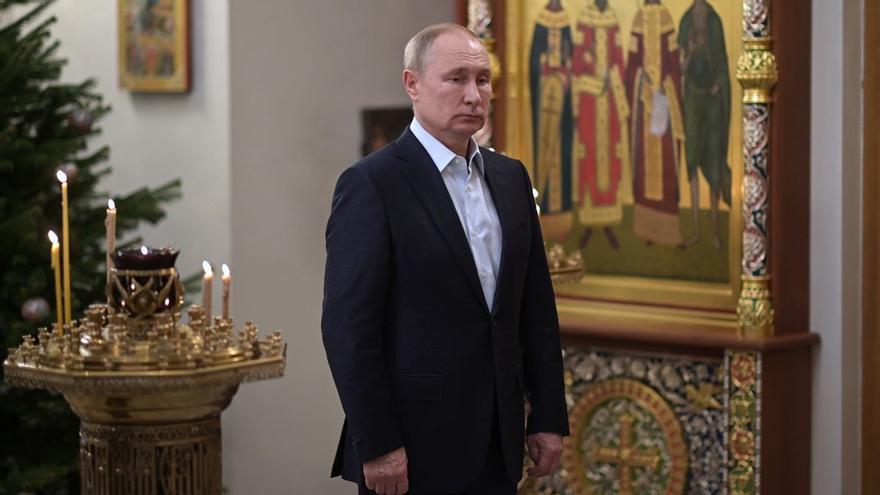
![]() 14ymedio, José Conrado Rodríguez Alegre, Trinidad, Cuba, 2 April 2022 — The person who is writing to you is a Cuban Catholic priest, pastor of the parish of Paula, in the city of Trinidad. Since February 24 I have been waiting for the news that arrives from Ukraine and I do not stop praying for that long-suffering people, and for their own country, for Russia, and for the presidents of both countries and their governments. I continually ask for the cessation of hostilities, for the return of peace to that region and to the world. I feel my heart oppressed by the scenes of destruction that I see (on the internet, because the press in my country hardly reflects what is happening in Ukraine) and by the stories of the innocent victims of this genocidal and unjust war that you have started in an unilateral manner.
14ymedio, José Conrado Rodríguez Alegre, Trinidad, Cuba, 2 April 2022 — The person who is writing to you is a Cuban Catholic priest, pastor of the parish of Paula, in the city of Trinidad. Since February 24 I have been waiting for the news that arrives from Ukraine and I do not stop praying for that long-suffering people, and for their own country, for Russia, and for the presidents of both countries and their governments. I continually ask for the cessation of hostilities, for the return of peace to that region and to the world. I feel my heart oppressed by the scenes of destruction that I see (on the internet, because the press in my country hardly reflects what is happening in Ukraine) and by the stories of the innocent victims of this genocidal and unjust war that you have started in an unilateral manner.
